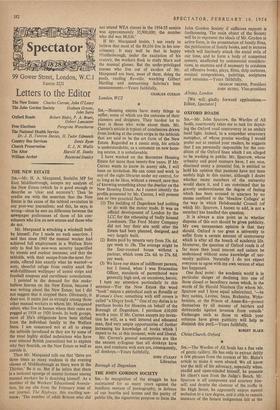Letters to the Editor
The New Estate Charles Curran, John O'Leary The John Gordon Society Graham Greene, John Sutra Oxford Roads Robert Blake, P. A. Brunt, Osbert Lancaster Free Elections Peregrine Worsthorne The National Health Service Dr. J. H. Twiston Davies, H. Tudor Edmunds Country Bus Services Denis Ryan Church Preservation E. J. N. Wallis The Altar Harold H. Danby William Archer Raymond Stanley THE NEW ESTATE
SIR,—Mr. H. A. Marquand, Socialist MP for East Middlesbrough, accepts my analysis of the New Estate (which he is good enough to describe as 'clear and accurate'): Then he credits me with the assertion that the New Estate is the cause of the tabloid revolution in our post-war journalism; and this, he says, is wrong—since he sees no difference between the newspaper preferences of those of his con- stituents who live on new estates and those who do not.
Mr. Marquand is attacking a windmill built by himself. For I made no such assertion. I said that since 1945 the manual worker had achieved full employment in a Welfare State only to find his new-won security imperilled by atomic and nuclear menaces; and that the tabloids, with their escape-from-the-news for- mula, offered him exactly what he wanted—a cosy, cheerful refuge from reality amid the wish-fulfilment wallpaper of comic strips and football coupons and curvilinear consolations.
I pointed to the demand for this make- believe heaven on the New Estate, because I was writing about the New Estate; but I did not suggest that it stopped there. Obviously, it does not. It exists just as strongly among those other manual workers to whom Mr. Marquand refers, who live in houses where their rents are pegged at 1939 or 1920 levels. In both groups, most of life's obligations have been shifted from the individual family to the Welfare State. I am concerned not at all to abuse the tabloids (produced as they are by some of the most highly skilled technicians who have ever entered British journalism) but to explain why they flourish, on the New Estate as well as outside it.
Then Mr. Marquand tells me that 'there are three times as many students in the evening classes of Middlesbrough as there were in the Thirties.' Be it so. But if he infers that there is a national upsurge of mental ferment among manual workers he is deceiving himself. As a member of the Workers' Educational Associa- tion, let me cite from the February issue of our journal, The highway, this startling sen- tence: 'The number of adult Britons who did not attend WEA classes in the 1954-55 session was approximately 35,900,000; the number who did was 88,036.'
If Mr. Marquand insists, I am ready to believe that most of the 88,036 live in his con- stituency. It may well be that in happy Isjiddlesbrough, under the exaltation of his oratory, the workers flock to study Marx and the musical glasses. But the under-privileged masses who live out of earshot of Mr. Marquand are busy, most of them, doing the pools, reading Reveille, watching Gilbert Harding and memorising Sabrina's bust measurements.—Yours faithfully, London, WC2
CHARLES CURRAN


































 Previous page
Previous page